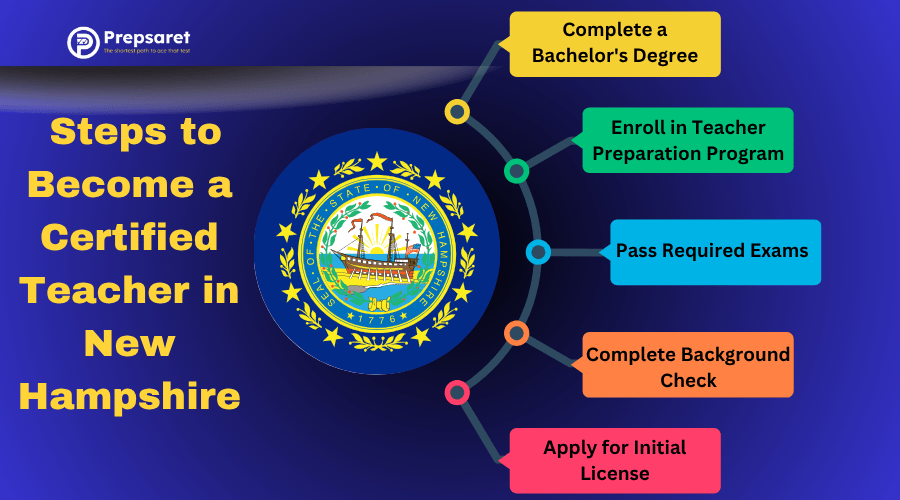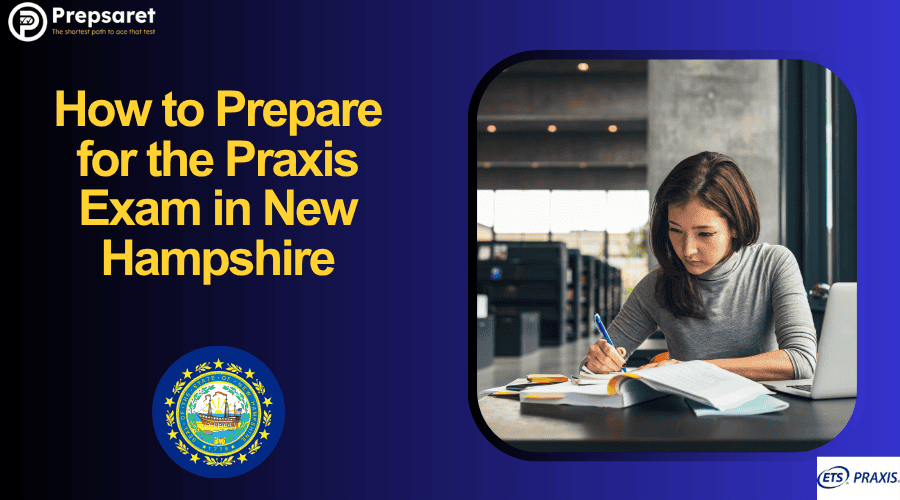Teaching in New Hampshire offers rewarding opportunities to shape young minds while enjoying the state’s excellent education system and quality of life.
Understanding how to become a teacher in New Hampshire requires navigating specific certification requirements, educational pathways, and licensing procedures.
The New Hampshire Department of Education oversees teacher licensing and maintains rigorous standards to ensure quality education across the state.
With Prepsaret’s comprehensive prep materials, aspiring educators can confidently tackle required exams and certification processes.
New Hampshire Teacher Certification Requirements
To begin your teaching career in the Granite State, you must meet specific New Hampshire teacher certification requirements. The basic eligibility criteria include:
- A bachelor’s degree in education or subject area you wish to teach
- Completion of an approved teacher preparation program
- Passing scores on required Praxis exams
- Background check for teachers in NH
- Student teaching or field experience component
Most programs require a minimum GPA of 2.5, though competitive programs may have higher standards. The bachelor’s degree in education should align with your intended teaching level and subject area, whether elementary, middle, or high school education.
Role of the NH Department of Education Teacher Licensure
The New Hampshire Department of Education teacher licensure division serves as the central authority for all teacher certification matters.
This department establishes standards, processes applications, and maintains the NH DOE critical shortage list to identify high-need teaching areas.
Key Responsibilities of NH DOE Teacher Licensure
The department manages critical functions that guide the teaching profession, including:
- Reviewing and approving teacher preparation programs
- Processing initial and renewal license applications
- Maintaining the NH teacher certification lookup database
- Publishing the NH DOE critical shortage list annually
- Overseeing continuing education requirements
NH DOE Certification Timeline
The NH DOE certification process typically takes 4-6 weeks once all materials are submitted.
The department also maintains the NH DOE critical shortage list which identifies subject areas and geographic regions experiencing teacher shortages, often providing additional incentives for candidates in these areas.
Teacher Education Programs in New Hampshire
New Hampshire offers multiple teacher education programs in NH through various institutions. These accredited programs provide the foundation for how to become a teacher in New Hampshire through comprehensive coursework and practical experience.
Institutions Offering Teacher Preparation Programs in New Hampshire
Several universities and colleges across the state provide approved programs, including:
- University of New Hampshire
- Plymouth State University
- Keene State College
- Southern New Hampshire University
- Franklin Pierce University
Each NH teacher preparation program combines theoretical knowledge with hands-on classroom experience to meet state certification standards.
Coursework and Training Components in NH Preparation Programs
Typical teacher preparation programs New Hampshire include courses and fieldwork in areas such as:
- Child development and educational psychology
- Curriculum design and instructional methods
- Classroom management techniques
- Assessment and evaluation strategies
- Special education awareness
- Technology integration in education
Flexible Pathways for Future Educators in NH
The teacher education programs in NH vary in length, specialization, and delivery format. Many institutions now offer evening, weekend, and hybrid options, making it easier for working professionals to transition into teaching.
How Long Does it Take to Get a Teaching License in NH?
Traditional programs typically take 4-5 years including bachelor’s degree and teacher preparation. Alternative routes may take 1-2 years for those with existing degrees.
Steps to Become a Certified Teacher in New Hampshire
Following these steps on how to become a certified teacher in New Hampshire ensures a smooth path to classroom readiness. Each stage builds the foundation for long-term success as an educator.
- Step 1: Complete a Bachelor’s Degree: Earn your undergraduate degree in education or your teaching subject area from an accredited institution.
- Step 2: Enroll in Teacher Preparation Program: Complete an approved teacher preparation program that includes student teaching experience.
- Step 3: Pass Required Exams: Successfully complete Praxis Core Academic Skills and subject-specific Praxis exams.
- Step 4: Complete Background Check: Submit to criminal history records check and fingerprinting.
- Step 5: Apply for Initial License: Submit application through the NH teaching credential process online portal.
- Step 6: Complete Student Teaching: Fulfill supervised teaching experience requirements in your chosen grade level and subject area.
Praxis Exam and Testing Requirements in NH
The Praxis exam New Hampshire requires varies depending on your intended teaching area and grade level. These standardized assessments evaluate your knowledge and skills necessary for effective teaching.
Required Praxis exam New Hampshire components typically include:
Praxis Core Academic Skills for Educators
This exam measures foundational skills required for all teachers. It includes three key areas:
- Reading (5713) – comprehension and analysis of written passages
- Writing (5723) – grammar, usage, and essay composition
- Mathematics (5733) – number operations, algebra, geometry, and statistics
Praxis Subject Assessments
These exams evaluate your content knowledge in the specific subject area you plan to teach. Examples include math, science, English, and social studies subject tests.
Praxis Principles of Learning and Teaching (PLT)
This assessment focuses on pedagogical knowledge, including:
- Instructional strategies
- Classroom management
- Student learning theories
- Assessment and evaluation methods
How to Prepare for the Praxis Exam in New Hampshire
Preparation is crucial for Praxis exam New Hampshire success. Prepsaret offers comprehensive practice tests with exact questions and answers, ensuring you’re thoroughly prepared for these critical assessments.
Read on: Praxis Practice Test
NH Teacher Certification Lookup Tool
After passing, you can verify your results through the NH teacher certification lookup system and also track your application status. This online tool streamlines the verification process and provides transparency throughout your certification journey.
Continue reading: Praxis Score Release Dates
Teacher Licensure Reciprocity in New Hampshire
Teacher licensure reciprocity NH allows qualified educators from other states to teach in New Hampshire more easily. The state recognizes valid teaching licenses from other jurisdictions, though additional requirements may apply.
Eligibility Requirements for Teacher Reciprocity in NH
New Hampshire teacher reciprocity for out-of-state teachers requires:
- Holding a valid teaching license from another state
- Completion of an approved teacher preparation program
- Meeting New Hampshire’s content and pedagogy standards
- Possible additional coursework or exam requirements
New Hampshire Teaching License Reciprocity Process
The New Hampshire teaching license reciprocity process varies depending on your origin state and teaching area. Some states have full reciprocity agreements, while others require additional steps.
Teacher licensure reciprocity NH agreements aim to attract qualified educators while maintaining state standards.
Benefits of Reciprocity in NH
New Hampshire teacher reciprocity for out-of-state teachers particularly benefits those in shortage areas. The streamlined New Hampshire teaching license reciprocity process helps address staffing needs while ensuring quality standards.
Alternative and Online Certification Routes
Non-traditional pathways provide flexibility for career changers through alternative and online teaching certification NH programs.
Alternative Routes to Teacher Certification in New Hampshire
Alternative teaching certification NH programs offer flexible entry points for professionals who already hold a bachelor’s degree in another field. These routes are designed for career changers and individuals seeking non-traditional pathways into education. Common options include:
- Master’s in Teaching (MAT) programs – Combine graduate-level coursework with classroom experience.
- Post-baccalaureate certification programs – Streamlined programs for those who already hold a degree.
- Emergency certification – Available in high-need subject areas or shortage districts, allowing candidates to teach while completing requirements.
- Private school pathways – Some private schools may hire teachers under reduced state requirements, though many still prefer certified educators.
These alternatives maintain rigorous state standards while providing flexibility for entering the profession.
How to Become a Teacher in New Hampshire Online
Online teacher certification NH programs make it possible to balance coursework with personal and professional commitments. Many universities and approved providers now offer:
- Fully online classes – Covering pedagogy, subject knowledge, and state-specific requirements.
- Hybrid programs – Blend online coursework with in-person student teaching.
- Flexible scheduling – Designed for working professionals and career changers.
If you’re wondering how to become a teacher in New Hampshire without a traditional education degree, these online and alternative routes offer viable options.
Some candidates may also qualify for emergency teaching licenses in shortage areas, which let you begin teaching while completing certification requirements.
Public vs. Private School Teaching in NH
Understanding the differences between public and private school teaching in NH is essential when planning your teaching career. Each setting offers unique benefits, requirements, and challenges.
Public School Teaching in NH
- Requires full state certification.
- Provides standardized salary scales and benefits.
- Often includes union representation and collective bargaining.
- Follows state-mandated curriculum standards.
- Offers greater job security through tenure systems.
Private School Teaching in NH
- May hire uncertified teachers, though certification is preferred.
- Compensation and benefits vary widely by institution.
- Often features smaller class sizes.
- Greater curriculum flexibility and autonomy in instructional design.
- Professional development requirements differ by school.
Can You Teach in NH Without Certification?
Yes, but only in limited cases. Private schools may hire uncertified teachers, and emergency licenses are available in critical shortage areas. However, public schools require full certification to ensure teachers meet state standards.
The public vs. private school teaching in NH comparison shows trade-offs between security and flexibility. Public schools typically offer more structured career paths, while private schools may provide more autonomy in teaching approaches.
Continuing Education and Renewal Requirements in NH
Maintaining your teaching license requires ongoing professional development through continuing education requirements. New Hampshire mandates specific professional development hours for license renewal.
Key Requirements for License Renewal in NH
- 75 hours of approved professional development every five years
- Graduate coursework options
- Professional conference attendance
- Peer observation and mentoring programs
- Action research projects
The NH DOE certification renewal process requires teachers to document their completed activities before renewal. Staying proactive with professional development not only secures your license but also strengthens your effectiveness as an educator.
Planning early is essential, many districts offer in-house opportunities that count toward renewal while supporting your career growth.
Costs, Salary, and Career Outlook For Teachers in NH
Choosing a teaching career in New Hampshire comes with both financial investments and rewarding long-term benefits. While the upfront costs can vary, available support programs and steady career growth make the profession an attractive option.
Cost of Becoming a Teacher in New Hampshire
Understanding the financial commitment is key to planning your journey into teaching. Typical expenses include:
- Bachelor’s degree tuition: $40,000-$120,000
- Teacher preparation program fees: $5,000-$15,000
- Praxis exam fees: $200-$400
- Background check fees: $50-$100
- Application and licensing fees: $100-$200
The cost of becoming a teacher in New Hampshire varies significantly based on your chosen pathway and institution.
However, various scholarships and loan forgiveness programs help offset expenses, particularly for teachers in shortage areas identified on the NH DOE critical shortage list.
Try this out: Praxis Mathematics (5733) Free Questions
New Hampshire Teacher Salary Overview
Teacher salaries in New Hampshire are competitive compared to regional averages.
- Average starting salary: $40,000–$45,000
- Additional benefits may include health insurance, retirement contributions, and union-negotiated increases.
Educators working in high-need subject areas or shortage regions may also qualify for incentives such as signing bonuses, loan forgiveness, or accelerated pay advancement. These opportunities make teaching in New Hampshire a stable and rewarding career choice.
Substitute Teaching in New Hampshire
Substitute teaching in New Hampshire is a flexible entry point into the education field. It allows aspiring educators to gain classroom experience, explore different teaching environments, and build confidence before pursuing full certification.
New Hampshire substitute teacher requirements include:
- High school diploma or equivalent
- Successful background check and fingerprinting
- Completion of district substitute teacher orientation
- Preference for a bachelor’s degree in some districts
- Clean driving record if transportation duties are involved
Substitute teaching offers insight into different schools, grade levels, and teaching styles. Many substitutes use this experience as a stepping stone to determine their preferred teaching environment before pursuing full certification.
Learn more: State-by-State Praxis Test Requirements for Teacher Certification
How to Become a Teacher in New Hampshire: FAQs
How to Become a Teacher in New Hampshire Without a Teaching Degree?
Alternative certification programs allow those with bachelor's degrees in other fields to obtain teaching credentials through post-baccalaureate programs.
What Is the Quickest Program to Become a Teacher?
Alternative certification programs for career changers typically offer the fastest route, often completed in 12-18 months.
Does New Hampshire Have a Teacher Shortage?
Yes, New Hampshire experiences shortages in certain subject areas and regions, documented in the annual critical shortage list.
How Much Do Teachers Get Paid in New Hampshire?
Teacher salaries range from approximately $40,000 for beginning teachers to over $70,000 for experienced educators, varying by district and education level.
Do You Need Your Master to Teach in NH?
A master's degree is not required for initial certification but may be necessary for salary advancement or specific positions.
How to Become a Teacher in New Hampshire: Conclusion
Successfully navigating how to become a teacher in New Hampshire requires understanding certification requirements, choosing appropriate educational pathways, and completing necessary assessments.
The New Hampshire Department of Education provides comprehensive support throughout the licensing process, while reciprocity agreements welcome qualified out-of-state educators.
With Prepsaret‘s expert prep materials and practice tests, aspiring teachers can confidently approach required exams and achieve their educational career goals in New Hampshire’s excellent school system.




